
Brazilian Black Beans with Winter Greens and Farofa
Preparation 25 mins, Cooking 30 mins
Want to get your products accredited with our trademarks? Find out more
What are you looking for?
Going vegan or eating more vegan meals means getting to grips with plant-based nutrition.
Eating a healthy balanced vegan diet can be easy. Once you’ve got the basics, and know what foods to include, you’ll enjoy getting all the nutrition you need!
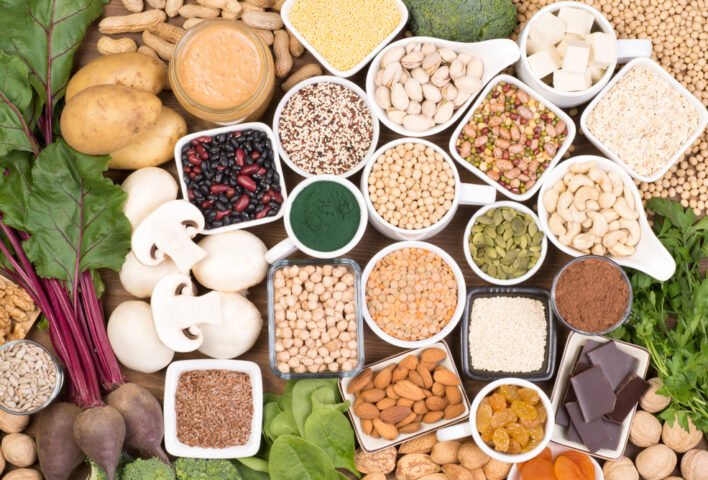
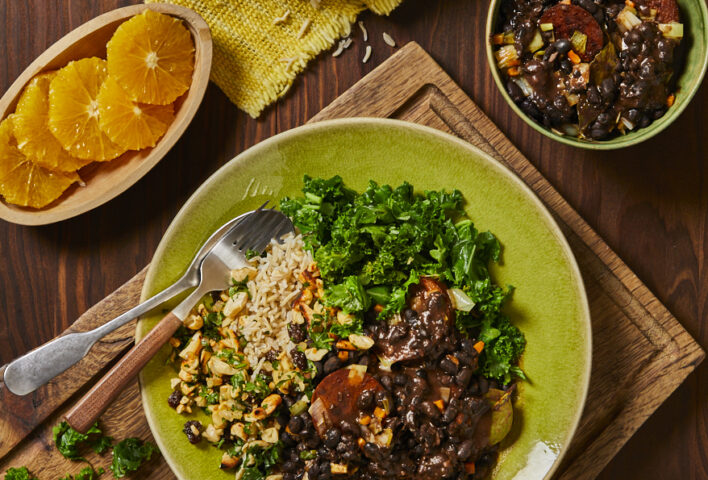
From baked beans to chickpeas, butter beans and kidney beans, these highly nutritious and satisfying foods are a great way to add protein to any recipe. Buy them ready-cooked in tins for convenience or dried in packets to save money (just remember to soak them properly before cooking).
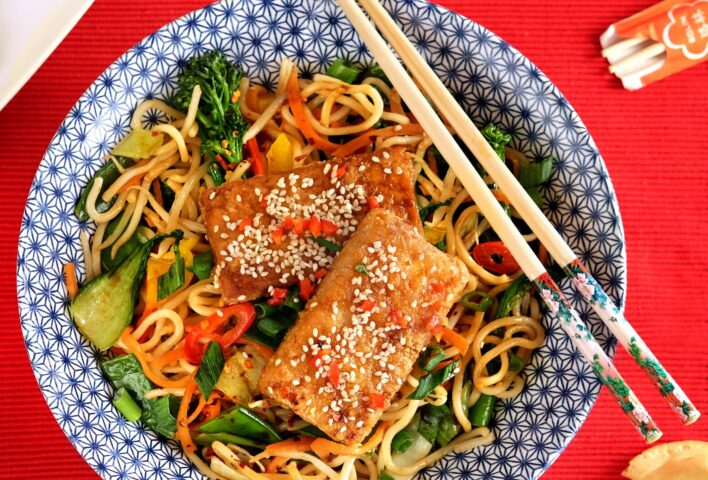
Tofu is made from soya beans and, when chopped into bite-sized pieces, tofu makes a great addition to a wide range of dishes such as stir-fries and curries. Tempeh is made from fermented soya beans and has a firmer texture. It makes a great alternative to tofu in dishes and is delicious marinated and served in a salad.

Nuts are a great way to add protein to a meal. Try adding cashews to a curry, or throw some flaked almonds into a salad for extra bite. Peanut butter stirred into low-fat coconut milk also makes an indulgent and nutritious sauce for a stir-fry.

A quick and convenient way to adapt your favourite meals is to use a meat alternative like Quorn or soya mince, and it can be really practical if you’re the only vegan in a household of meat-eaters. Some meat-eaters say they can’t even tell the difference!

Kick-start your day the healthy way with a nourishing bowl of muesli, porridge or bran flakes for a wholegrain hit, and add ground flaxseed for omega-3. A sprinkling of berries or a small glass of juice will add essential vitamin C, which helps your body absorb iron. If you are using plant-based milks or yogurts for breakfast, remember to use calcium and vitamin B12 fortified varieties. Add nuts for extra iron. Or if you fancy cooking, try some scrambled set tofu for a protein and calcium hit.

Move things on with a bit of variety! If you had cereal or porridge for breakfast, it’s time for a more substantial lunch. Choose falafel or vegan Quorn sandwich slices in a veg-packed salad made with rocket or watercress. As an alternative to white bread, consider wholemeal, rye or seeded loaves. If you had a large breakfast follow it with something lighter, maybe a grain-based dish like couscous, quinoa or brown rice salad, a wrap or soup packed with vegetables and beans. Remember, a portion of beans or lentils count towards your five-a-day! Round things off nicely with some nuts and fruit or fortified soya yogurt.
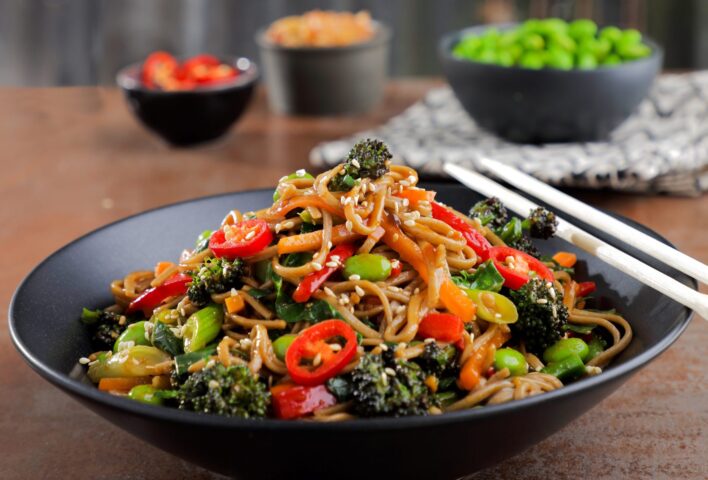
You should aim for an equal balance of protein and carbs. Whether you’re having lentils, tofu or soya mince, pair it with something grain-based like rice, noodles or wholewheat pasta. Remember grains, pulses and nuts are great for iron too. Add cashew nuts to a curry or throw some beans into a stew. Squeeze in colourful extra veg by having some in your main meal and dark leafy greens on the side. Try steamed broccoli for extra calcium. For vitamin B12, extra protein and richness use plain unsweetened soya yogurt as a topping or accompaniment. Yeast flakes with vitamin B12 make a lovely savoury addition to sauces.

If you love pudding, then good news! It can actually be nutritious, as long as you watch out for sugar and fat. Try a sundae made from berries and silken tofu topped with toasted oats and you’ll be bagging some protein! Try fresh or frozen soya yogurt as a healthier alternative to ice cream and top with crunchy granola and fresh fruit. And don’t forget humble rice pudding – you can make this using fortified plant-based milks and is fabulous with sliced banana or a handful of blueberries.

Keep your blood sugar levels stable and add a nutritional boost with a mid-morning and mid-afternoon snack. Dip some carrot sticks in a pot of creamy houmous for protein more veg towards your five-a-day). Drink fortified plant-based milk or smoothies for a convenient, quick and nutritious snack full of protein and calcium. But keep it varied – try cereal bars and trail mix (if you didn’t have grains or nuts for lunch), fresh or dried fruit, or peanut butter on crackers. Bananas will give you a quick potassium boost. If you feel like cooking, try roasting some pumpkin and sesame seeds in the oven with a splash of low-sodium soy sauce to make a crunchy snack.
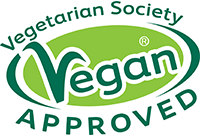
No need – scientists have found soya foods to be nutritious, safe and healthy. Products made from soya beans such as tofu, soya milk and soya yogurts are a great protein source and can be a good alternative to dairy. And the amount you eat doesn’t matter – for people consuming typical or above average amounts, studies show no adverse effect on fertility or hormonal balance. For women in particular, there may even be positive advantages! For optimum benefits if you’re using soya dairy-alternatives, choose products fortified with calcium and vitamin B12.
Omega-3, one of the so-called ‘good fats’, it is vital as part of a healthy diet and is crucial to keep our eyes and brains in tip-top condition. Vegan sources include flaxseed oil and ground flaxseeds, rapeseed oil, chia seeds, pumpkin seeds and walnuts. A supplement containing types of omega-3 called DHA and EPA can be convenient.
As long as you’re eating a variety of balanced vegan meals you’ll be getting the nutrients your body needs. One exception is vitamin B12. Even if you’re eating plenty of vitamin B12 fortified foods the advice is to take a supplement. This is easy: 10 micrograms a day or 2000 micrograms just once a week. Another thing to consider is vitamin D – the ‘sunshine vitamin’. For anyone living in the UK – whether vegan or not – it’s now recommended to consider taking a daily 10 microgram vitamin D supplement during autumn and winter, simply because the sun doesn’t shine enough! And those who don’t get outside much, or routinely cover their skin, should take a vitamin D supplement throughout the year.
You don’t have to miss out on tangy cheese in your vegan meals. There are plenty of vegan cheeses available to buy from cheddar to mozzarella. Vegan cheese is mainly made from coconuts. Just like dairy cheese vegan versions are high in fat and salt but as part of a balanced vegan diet it should be
okay to use vegan cheese sparingly for flavour. As an alternative to cheese in cooking, try experimenting with nutritional yeast flakes and a Japanese product called miso to give a similar flavour. You can also make an easy cheese sprinkle by mixing ground almonds with nutritional yeast flakes and a pinch of stock powder.

Preparation 25 mins, Cooking 30 mins

Preparation 20 mins, Cooking 50 mins
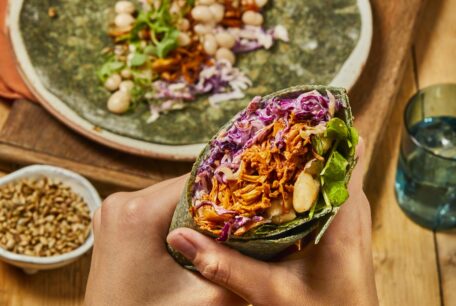
Preparation 35 mins, Cooking 48 mins